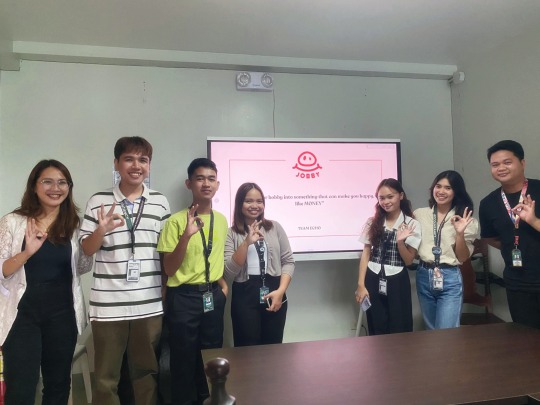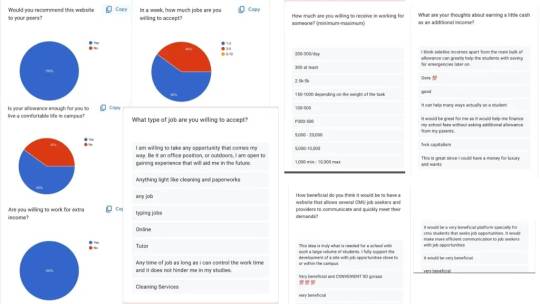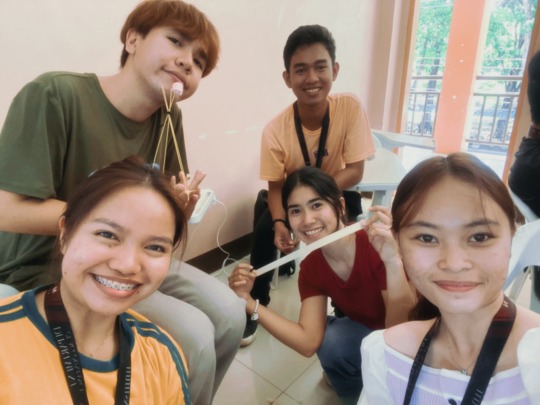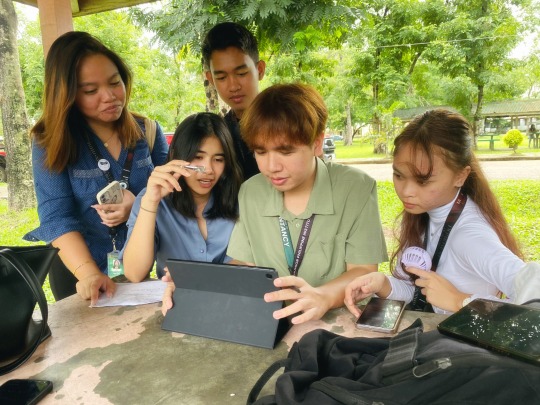Text

“as an entrepreneur, you never stop learning”
those exact words were uttered by Daymon John, a successful businessman which we probably have seen in the TV show Shark Tank. It was always emphasized in class that anyone aspiring to be an entrepreneur must commit to a lifetime of learning. Generating new ideas entails learning about what already exists, where there are gaps, and what can be done to fill them. With this in mind, we were able to develop Jobby. This was the idea that stood out the most from the start; as students, we understand the struggle of managing finances in college, and this feeling inspired us to create something that would benefit not only students but also faculty.
Our most difficult challenge in creating jobby was deciding which revenue model to use for our business. We were unsure whether the model we chose would be the best fit for our business. For three days, "Okay raman siguro ni nuh," "Okay rani uy," and "Pero pwede man kani na model oh" were common conversations. We were so conflicted that we considered changing the entirety of our business and give up. This demotivated us, but with the help of our groupmate Karylle, she studied for days to explain the differences between each of our chosen revenue models. She was a saving grace in our group, a beacon of hope.

This challenge only strengthened our bond as a team, and it made us realize that we needed to put more effort into developing our business idea. We spent the next few days working on furnishing our idea and were successful. This is what makes entrepreneurship enjoyable: it enables me to collaborate with talented people. Working with others promotes teamwork, which can help by creating a learning environment in which we can share our knowledge, skills, and insights. Working with others allows me to learn from their mistakes, successes, and feedback. It can also help us grow as leaders by pushing us to inspire, empower, and support each member of our team.
Our journey through the subject GEE 16 has come to an end, but it has provided us with so many insights that we will undoubtedly carry with us when we graduate and plan to start our own businesses.
0 notes
Text

"Hala, wala nakoy kwarta!"
This is the most common phrase we hear with our peers in the university. Managing our allowance is a hard thing to do lately, especially that the prices of essential goods are now rising paired with the fees and other expenses we spend on our day-to-day life. As a student ourselves, we always imagine the feeling of need not to worry about finances and just mainly focus on academic performance. Thus, we conducted an interview with our fellow students in the university to discover what our target market’s main problem here in campus.

The survey showed that most of the students we interviewed face financial problems. They indicated that sometimes their allowances aren’t enough for them to live a comfortable life in campus. That’s why they are willing to earn extra cash so that the burden of worrying about money would be eradicated. Some are willing to be students’ assistants while some are also willing on accepting laundry task. As long as they have free time, they are willing to accept 3-5 jobs a week.
Additionally, we also thought of how faculty members and staff of the university often seek help to students in exchange of monetary rewards in instances wherein they are very busy. So, we validated this thought by conducting an interview with them. The interview confirmed our thoughts as the faculties conveyed their frustration and needs in times wherein, they are time constrained. They are mostly willing to pay 250 – 1000 pesos to students depending on the task they would assign to them.
Thus, we pursed the creation of Jobby. A consolidated platform that would help both students and faculty In the university. This decision is rooted from the results our survey and this would enable us to create something that is beneficial to the community. So far with our validation, our target market are welcoming of the thought of establishing a website to address such issues and would recommend them to their peers.
0 notes
Text

"Entrepreneurs solve societal problems"
This phrase is from my previous blog which has struck me the most; I’ve come to realize that the core in entrepreneurship is to find a problem and be the solution. These past few weeks, our team has been able to identify a problem, formulate solutions, introduce innovation, and create a business model canvas. In short, a lot has happened since I posted my last blog. So today, I will summarize my team’s journey on how we are developing our business idea!
There would be no business ideas if our society was free of problems, right? So we began by identifying our fellow students' problem. To identify the problem, we conducted a survey via google forms which showed that most students are commonly faced with financial problems, with some stating that they would reach a point wherein they borrow funds from their friends or are finding an immediate job to provide for themselves in times of such crisis. Based on this information, my team and I started brainstorming various solutions. Initially, we considered creating our own student loan service, but as we are still students ourselves and considering our available resources, we opted for another approach. Instead, we decided to develop an app or website that serves as a platform for students to find available local job opportunities.
Thus, "Jobby" was born.

Our business aims to assist students in securing funds for their academic pursuits, while also helping university faculty and staff by connecting them with student assistance when needed. This idea stood out the most to us because we can empathize with this type of problem because we, too, are students who know what it's like to have so many bills to pay in school that drain our finances.
Fortunately, our business idea passed the evaluation stage, with our instructor suggesting some changes in our business proposal such as focusing on developing a website rather than an application. With these suggestions in mind, we refined our business concept and are currently working on our business model canvas.

Getting to this point hasn't been easy; we encountered setbacks and initially questioned our idea. However, we, as a team, overcome such challenges. We integrated our diverse skills, knowledge, and experiences to generate not only innovative ideas but also solutions to our problems. This is what makes us a strong team; we are deeply committed to teamwork. We made it clear from the start that the success of our business idea is dependent on our ability to collaborate effectively and our passion to help our fellow students.
0 notes
Text
Nowadays, countless students aspire to run their own business, driven by the motivation for autonomy, financial security, and vocational flexibility. Some of my fellow student have already initiated on doing their own business, while others will probably inherit family businesses, hoping to strengthen and extend their legacy. In contrast, others dream on launching their own startup to address the emerging need of the community.
This led me to question myself; “Do I really have the mind of an entrepreneur?”
But before I answer the question, let's take a recap of what I learned during the week. Entrepreneurship is fundamentally the process by which individuals pursue opportunities without regard to resources they currently control. Entrepreneurs shape our economy as the foundation for socio-economic development. Although, Businessmen and Entrepreneurs have the same desire to succeed, their objective is what makes them different. Businessmen run their businesses for the main purpose of making profits. Entrepreneurs, on the other hand, is not only about making a profit but to make a difference by solving societal problems.
But to be able to solve societal problems, it requires us to step out of our comfort zones, challenge conventional norms, and strive to seek for practical solutions. As Ken Singer puts it, “A start up is an act of rebellion.” In today's society where mediocrity is often the standard, pursuing for personal excellence is the most daring form of rebellion. Creativity and Innovation is the lifeblood of entrepreneurship. These two elements are the stimulants that drives new ideas, opens up markets, and creates value in unexpected places. Entrepreneurs embrace failure as a part of the process, viewing it as an opportunity to learn and grow rather than something to fear, asking “why not?” when others say “it can't be done.”

To answer the question: "I do not possess the mindset of an entrepreneur but I am being honed to be one." Such mindset goes beyond the ability to generate business ideas but it also involves a diverse set of qualities that transform the way I approach various aspects of my life. Embracing failures in my life is a valuable learning opportunity that fosters my entrepreneurial potential, as well as an avenue for growth and development. Furthermore, I realized that an entrepreneurial mind is not an inherent trait but it's a skill that can be developed and honed with the right approach and commitment.
"You don't learn to walk by following rules. You learn by doing and falling over. "
-Richard Branson

1 note
·
View note